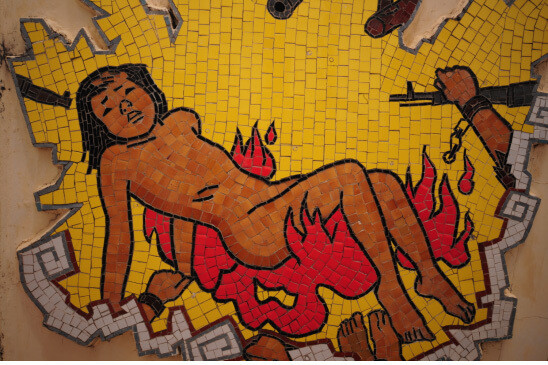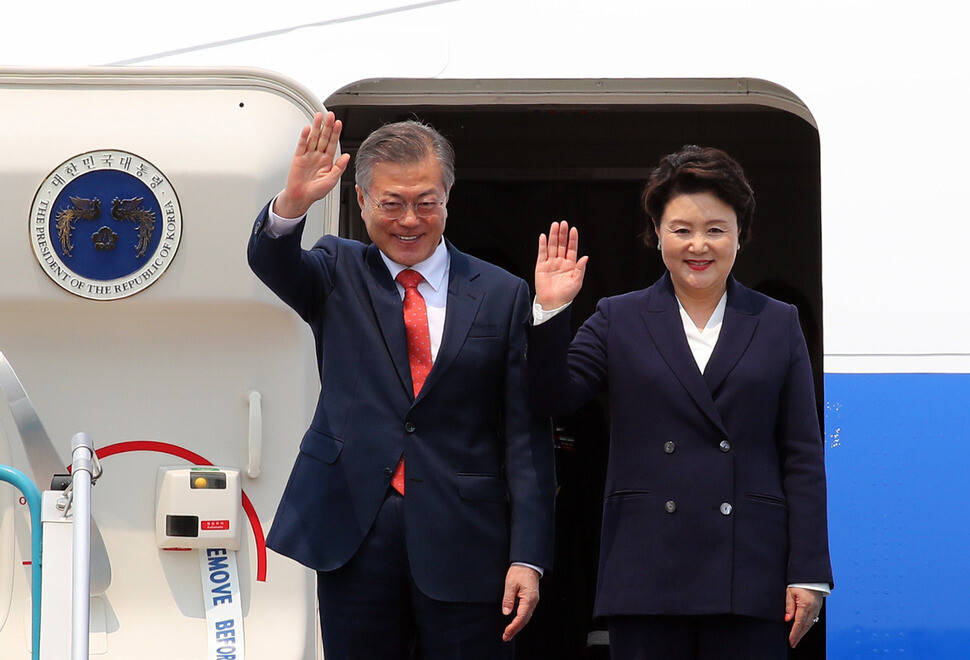hankyoreh
Links to other country sites 다른 나라 사이트 링크
[Column] Time has come for South Korea to formally apologize for Vietnam War atrocities

In our first meeting early this year after exchanging emails, Korea-Vietnam Peace Foundation board member Ku Su-jeong immediately suggested that I accompany her on Mar. 11 to a 50th anniversary memorial ceremony at the village of Ha My in Vietnam’s Quang Nam Province. She said it would be the first time a Republic of Korea National Assembly member attended a ceremony for victims of civilian massacres by South Korean troops.
When I finally arrived at the village of Phong Nhi and Phong Nhat near Da Nang and stood before the stone memorial, what I saw took my breath away. Inscribed on the stone were serial numbers, along with the victims’ dates of birth: 1968, 1967, 1967, 1967, 1966, 1965, 1964, 1964, 1963, 1963, 1963, 1963, 1962, 1961, 1961, 1961, 1960, 1960, 1960, 1960, 1960, 1959.
What had happened here? The massacre took place on Feb. 12, 1968. There’s no need to work the numbers out – these were young children. Even someone born in 1959 would not have yet turned ten.
The victims’ names were of course engraved on the stone as well. The guide explained to me that “Thi” is a common name among Vietnamese women. Most of the names of adults on the stone had “Thi” in them. The majority of the 74 victims were women and children. This was not only the case at Phong Nhi/Phong Nhat – the same was true for the 135 victims at Ha My. Many of them were children who died before even being given a name by their parents. At every village we visited, we were told the victims had been unarmed. Yet all of them were slain, from newborn babies to pregnant mothers. The sites of the massacres were mainly air-raid shelters and the yards of houses.
I was dumbfounded. The survivors of that day raged: war or not, why did they massacre children? Why had they themselves been spared? How could such terrible suffering be inflicted?
The trip lasted for three days, but no journey in my life has ever felt longer or more painful. My heart and body ached. I fell to my knees. At the Ha My memorial ceremony, I prostrated myself and apologized. I begged forgiveness in front of survivors who had recorded on the wall of a tomb for nine family members slain there that this was a war crime committed by South Korean soldiers. We wept together.

The time has come for the South Korean government to formally apologize. This has gone on for far too long, and the Vietnamese people have been patient for a tremendously long time. Some of the eyewitnesses asked me why there were no veterans in our party. They wanted to know if any of us were family members of the soldiers. Seeing this misery and struggling among the victims, I was at a loss for words when they told me they wanted to comfort the people who had perpetrated these inhuman acts. How much more difficult it must have been for them, they wondered. How could they have lived with the suffering?
Rising buildings and rising national incomes do not make people civilized. Civilization must come with reflection and introspection. We need to apologize for our misdeeds. This is not a matter of the individual veterans themselves; the state must take responsibility. As I write, new memorial stones are being raised in Vietnam. Local government are keeping records and designating historic sites. How is this any different from the comfort women statues being raised in South Korea?
The Republic of Korea must not go the route of Shinzo Abe. It is neither civilized nor wise. President Moon Jae-in has declared a “New Southern Policy,” stating the goal of ushering relations with the ASEAN countries to the same level of the Korean Peninsula’s four main neighbors. An honest apology to Vietnam would be a starting point for that. This is the right moment. Moon arrived in Vietnam on Mar. 22. I hope that when he does, he will sit knee-to-knee with the survivors and the victims’ kin – sharing words of comfort befitting a president who took office amid candle flames symbolizing peace.
By Kim Hyun-kwon, Democratic Party Lawmaker
Please direct questions or comments to [english@hani.co.kr]
Editorial・opinion
![[Editorial] Does Yoon think the Korean public is wrong? [Editorial] Does Yoon think the Korean public is wrong?](https://flexible.img.hani.co.kr/flexible/normal/500/300/imgdb/original/2024/0417/8517133419684774.jpg) [Editorial] Does Yoon think the Korean public is wrong?
[Editorial] Does Yoon think the Korean public is wrong?![[Editorial] As it bolsters its alliance with US, Japan must be accountable for past [Editorial] As it bolsters its alliance with US, Japan must be accountable for past](https://flexible.img.hani.co.kr/flexible/normal/500/300/imgdb/original/2024/0417/6817133413968321.jpg) [Editorial] As it bolsters its alliance with US, Japan must be accountable for past
[Editorial] As it bolsters its alliance with US, Japan must be accountable for past- [Guest essay] Amending the Constitution is Yoon’s key to leaving office in public’s good graces
- [Editorial] 10 years on, lessons of Sewol tragedy must never be forgotten
- [Column] A death blow to Korea’s prosecutor politics
- [Correspondent’s column] The US and the end of Japanese pacifism
- [Guest essay] How Korea turned its trainee doctors into monsters
- [Guest essay] As someone who helped forge Seoul-Moscow ties, their status today troubles me
- [Editorial] Koreans sent a loud and clear message to Yoon
- [Column] In Korea’s midterm elections, it’s time for accountability
Most viewed articles
- 1[Column] The clock is ticking for Korea’s first lady
- 2Samsung barricades office as unionized workers strike for better conditions
- 3[Editorial] When the choice is kids or career, Korea will never overcome birth rate woes
- 4[News analysis] After elections, prosecutorial reform will likely make legislative agenda
- 5S. Korea, Japan reaffirm commitment to strengthening trilateral ties with US
- 6Japan officially says compensation of Korean forced laborers isn’t its responsibility
- 7Why Israel isn’t hitting Iran with immediate retaliation
- 8[Editorial] Does Yoon think the Korean public is wrong?
- 9[Guest essay] How Korea turned its trainee doctors into monsters
- 10[Editorial] As it bolsters its alliance with US, Japan must be accountable for past